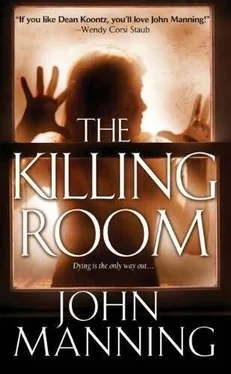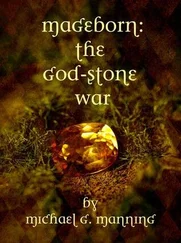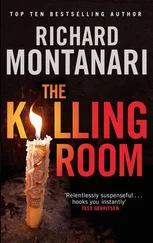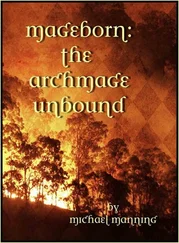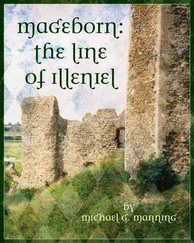Douglas stared at the stone.
“Why did Beatrice want me to see this?” he asked out loud.
He traced the M with his finger.
Malcolm.
Perhaps it stood for Malcolm.
Was that Beatrice’s last name? Was this the place where they had buried her? Here, in an unmarked grave. Forgotten by the world.
But the cherub…
Something about the cherub.
It frightened him. Cherubs were little angels. Symbols of love. Cupid was kind of a cherub. With his little boy’s body and his magic arrows of love. There was nothing frightening about Cupid.
But this little winged figure set Douglas’s heart racing.
It had been roughly carved. A local stonecutter had most likely been hired to do a rush job. Someone had told him to carve a cherub above the M. And so he had etched a rough approximation of a human face and attached two wings in place of ears. The mouth on the face was open, perhaps in song. But it looked as if it were crying.
Or screaming.
Suddenly Douglas felt a terrible chill. He stood up, letting the grass obscure that terrible cherub once again.
M.
What was M?
What lay buried under that stone?
It felt good to be back in New York. Carolyn took considerable comfort in the bleating of taxicabs and the rumble of the subway. She felt safe here, far away from the mysteries of Mr. Young’s house in Maine. It was good to see Andrea, to spend a little time with her, to hear her laugh. And it was ever so good to get back home, to her own apartment, and pretend for a few stolen hours that the room in Mr. Young’s basement was just a figment of her imagination-or at least something so far away that it couldn’t touch her.
But touch her it did. Unless she could prevent the lottery, it waited to claim another life.
A life that might be Douglas’s.
She closed her eyes now as she waited for the green WALK sign. She was at the corner of Houston Street and Avenue A. This wasn’t her neighborhood. Carolyn lived in Hell’s Kitchen, rapidly transforming itself into one of Manhattan’s trendiest areas. Here in the East Village, bohemia still clung tenaciously to the streets. She opened her eyes and looked across the street. Somewhere in that block lived one of the most unusual people she had ever met in her entire life. And she was depending on her now to provide the solution to the problem that plagued the Young family. It was no longer just an assignment for Carolyn. It was no longer just a means for making money.
It had become personal.
As the light changed, Carolyn began a brisk walk across the street. She couldn’t deny the feeling that had surged up inside her the moment Douglas had moved to kiss her. She had shared so much with him. She hadn’t felt that comfortable with a man-with anyone-in a very long time. She had told him about Mom, and about Andrea. She had even told him about David. She figured she might as well: who’s to say Howard Young would not tell him at some point?
She didn’t fully trust Mr. Young. He withheld too much. She still didn’t know if he chose to withhold-or if some power prevented him from revealing too much. But she knew that he possessed information that could help her find an answer. By not sharing such information with her, he made her job more difficult-just as he had made Kip’s job more difficult, and no doubt Dr. Fifer’s job and the jobs of all those who had tried to end the curse before her. It was as if, on some level, Mr. Young didn’t want them to succeed.
But that’s crazy, Carolyn thought as she reached the other side of the street. His grief is very real. He has seen so much tragedy. He wants it to end. I have to believe that he wants it to end.
On the sidewalk ahead of her, a dreadlocked young man played the xylophone. Carolyn smiled to see a trained gibbon, attached to the man’s leg by a leash, dancing to the music its master made. People had stopped to watch and laugh.
If only I could stay here in New York, Carolyn said. Never go back to Maine.
Maybe she should have refused the assignment. But she wasn’t able to walk away. Not then, not when she realized that someone would die and that she was their only chance. And certainly she couldn’t turn her back on the job now, not when it might be Douglas who faced death.
I like him, Carolyn thought. I like him a great deal.
That was why she had been distant the day she left. The emotion was too troubling. The last time she had fallen in love, she had been hurt. Badly. Now, she might fall in love only to watch the man she loved walk into that room and never walk back out. And it would be because of her. Because she never found the solution.
“Diana must have the answer,” Carolyn said out loud, heading up the brownstone steps and ringing the doorbell. “She must.”
“Who is it?” crackled the voice over the intercom.
“Diana, it’s Carolyn Cartwright.”
“Oh, yes, Carolyn. Come upstairs.”
The door buzzed, and Carolyn pulled it open.
The tenement was in bad repair. The plaster on the walls was cracking, and the entire building had sunk a bit, leaving the steps at an angle. Diana lived on the very top floor, the fifth. There was a rickety, early twentieth-century cage elevator, but Carolyn preferred the stairs. She had been here several times before. Once she’d gotten stuck in the elevator. She didn’t want that experience again.
Only slightly winded, Carolyn finally made it to the fifth floor. Diana’s flat was in the rear of the building. She had lived here for more than fifty years, since she was a little girl. It had been her mother’s flophouse then, a place where she turned tricks for money. Diana had been born from one such liaison. She never knew who her father was, but she thanked him for one thing: the extraordinary power she had. “It had to have come from my father,” Diana told Carolyn. “Because my mother was as ordinary as she could be.”
Yet not so ordinary, really. It took extraordinary courage to do what Diana’s mother did. Against the furious demands of the state and city welfare departments, she insisted on keeping her baby. She understood that Diana would never be like other girls, but no one else, she said, was going to raise her baby girl.
Carolyn tapped lightly on the door. “Diana?” she called.
As she expected, the lock in the door slid open, and the door opened inward on its specially designed spring. Carolyn’s eyes flickered instinctively to the ceiling of Diana’s flat, where a cord ran from the door across the length of the room to Diana’s custom-made chaise by the window. Diana could lie there and open the door-with her teeth.
Carolyn smiled. Diana held the cord between her teeth, because she had no arms. Nor did she have legs. She was just a head and a small torso, thirty-three inches from top to bottom. She was wearing only an oversized white T-shirt emblazoned with a big Superman S.
“Carolyn!” Diana called, spitting the cord from her mouth. “How wonderful to see you again.”
Carolyn closed the door behind her, even though she knew, with a different tug of her cord, Diana was perfectly capable of doing it herself.
“Hello, Diana,” she said. “How are you doing?”
“Busy writing another book.” The walls were lined with Diana’s books, volumes describing the various escapades she had assisted with. There were a couple of adventures with Carolyn recounted in those pages. Of course, Diana disguised it all as fiction, changing names to protect both the innocent and the guilty. She didn’t want any more freaks coming by her door to bother her. She had enough as it was.
Like Carolyn.
“You’re getting rich off these books,” Carolyn said, sitting down in a chair opposite Diana’s chaise. “Why don’t you buy yourself a nicer place?”
Читать дальше
